Premium Only Content

Biblical Perspectives on Pastoring an International Congregations
Related Sermons:
Growing Pains: https://youtu.be/WFNExGgDszI
Shepherds that Preach - Part 1: https://youtu.be/B_-0ytISVPc
Shepherds that Preach - Part 2: https://youtu.be/-nP-8r1Tcbo
Sons of God Through Faith: https://youtu.be/SwxcvQ3gwOg
A Window Open in Heaven - Part 1: https://youtu.be/_bpJpMqDf3w
A Window Open in Heaven - Part 2: https://youtu.be/nFFT8DKiWF8
He Who Holds the Scroll: https://youtu.be/WpjvQ5EVf1Y
According to US census data Houston, Texas, is often considered the most diverse city in the United States. This is where Dr. Richard Caldwell and Dr. Josh Philpot serve as elders/pastors of Founders Baptist Church (FBC). Dr. Philpot shares that FBC has seen an increasing diversity in our congregation, with people coming from all parts of the world. He asks Dr. Caldwell if he would share, from his standpoint and as the primary teacher at FBC, how does one go about pastoring an internationally diverse church? Is diversity within a congregation mandated in Scripture? Should a local church reflect its community or those living within the area where the church is located? These and other questions will be addressed and answered on this week’s Straight Truth Podcast. Join us to hear their biblical perspectives and insights from Scripture texts of Acts, Galatians, and Revelation.
Dr. Caldwell confirms that FBC is a very diverse church but also shares that it is not something they’ve aimed at. There was no strategy they put together or formulated to make the congregation into such a diverse group. He doesn’t see any emphasis in the New Testament on trying to create diversity in the life/body of the church. The church is to deal with each and every person in a way that accords with Scripture.
For example, Dr. Caldwell sees an interesting dynamic in the New Testament where ethnicity and cultural differences are acknowledged and times when even sensitivity is indicated in the text. He relates Acts 6, which involves a complaint that arises on behalf of the Hellenistic (Greek Jews- probably both cultural and speech) Jews against the native (Hebraic) Jews; both groups being Christians. Dr. Caldwell explains how the situation was handled and dealt with conveys a sensitivity to the differences and concerns. So while there’s an acknowledgment of cultural and ethnic differences, along with a sensitivity to it, it is handled in a way that underscores and exhorts in the light of the fact, that it really doesn’t matter. Additionally, he goes to Galatians 3:26-29 to help us consider what Paul means when he says there is no longer Jew or Greek, male or female, slaves or freemen. He explains that these are all realities yet are relatively unimportant because what matters is that we are all in Christ. So what is emphasized at FBC is biblical anthropology – who we are as men and women made in the image of God, regardless of skin color, regardless of the country one comes from, regardless of the culture one is raised in. We have to emphasize what the Bible emphasizes about us as people. So as your view of humanity is shaped by the Scriptures and is faithful to them, believers begin to understand this and begin to function that way. In this way, you have a church full of all kinds of diversity when in the most important sense, there’s no diversity. Because we are all one in Christ Jesus, there’s unity, peace, and joy as we see people through the eyes of God, and that’s what we are to aim at.
What about those who look at Revelation 4 and 5, seeing to use it as a basis for either church ministry or for setting forth a plan to put together a church? Is this a pragmatic sort of approach, seeking to form an ethnic and cultural diversity among the elder body, to then bring this kind of congregation together? Is this a good way to bring a church together or even to establish leadership?
Dr. Caldwell reminds us that the standards for leadership are given in Scripture, where there’s no mention of ethnic or cultural representation. A man is either qualified or he isn’t. These other temporary, temporal distinctions do not matter. Scripture does not instruct us to construct a leadership group that represents the entire congregation concerning ethnicity or culture. We are to be faithful to the Word of God, and the Spirit of God, who regenerates and teaches believers the Word of God, will create whatever diversity that will exist in the life of the church. Hence when we read Revelation 4 and 5, and one day will see, before the throne of God, every tongue, tribe, and nation, that’s the point; it’s the Lord that does that.
What about those who visit FBC on a Sunday and say they probably could not continue to attend because they don’t see enough people who look like them or enough diversity here for them? How would this be handled, and what could be done to encourage these visitors biblically?
Dr. Caldwell says he would attempt to sit down and speak with them if given the opportunity.
-
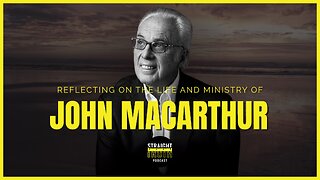 26:30
26:30
Straight Truth Podcast
24 days agoFaithful to the Final Verse: Reflecting on the Life and Ministry of John MacArthur
551 -
 LIVE
LIVE
Steven Crowder
2 hours ago🔴 BREAKING: Trump Declares Federal Control of DC
45,866 watching -
 33:22
33:22
VINCE
2 hours agoThe Problem With The Republican Party (w/ Shawn Farash) | Episode 100 - 08/11/25
52.6K70 -
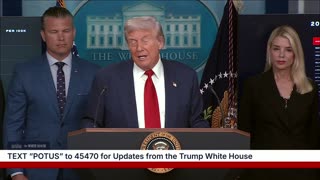 LIVE
LIVE
The White House
2 hours agoPresident Trump Holds a Press Conference, Aug. 11, 2025
4,920 watching -
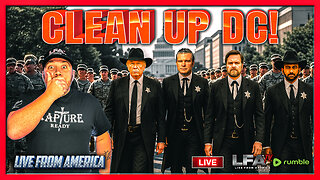 LIVE
LIVE
LFA TV
16 hours agoLFA TV ALL DAY STREAM - MONDAY 8/11/25
4,502 watching -
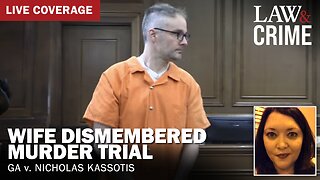 LIVE
LIVE
Law&Crime
1 hour agoLIVE: Wife Dismembered Murder Trial – GA v. Nicholas Kassotis – Day 5 – Part 2
122 watching -
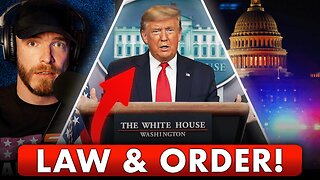 1:57:03
1:57:03
Dear America
3 hours agoIs Trump Going To Federalize DC TODAY?! + Biden Pardons VOIDED?!?!
79.2K57 -
 LIVE
LIVE
Barry Cunningham
13 hours agoPRESIDENT TRUMP HOLDS PRESS CONFERENCE ABOUT CRIME AND BEAUTIFICATION OF WASHINGTON D.C.
2,080 watching -
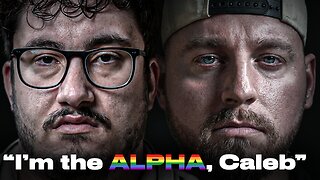 LIVE
LIVE
Caleb Hammer
18 hours ago$350,000+ Of LGBT Debt | Financial Audit
99 watching -
 17:46
17:46
Chris Harden
5 days agoI Found The Mountain Where Retired Millionares Hide
191